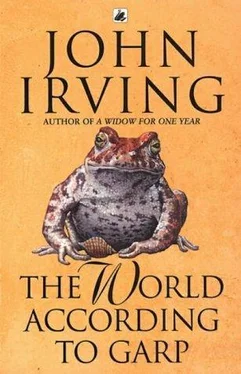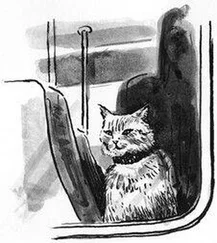A professional in a world that too often worshiped the contemporaneity it had created, John Wolf insisted to his end that his proudest publication was the father and son edition of The Pension Grillparzer . He was proud of the early Garp novels, of course, and came to speak of The World According to Bensenhaver as “inevitable—when you consider the violence Garp was exposed to.” But it was “Grillparzer” that elevated Wolf—it and the unfinished manuscript of My Father's Illusions , which John Wolf looked upon, lovingly and sadly, as “Garp's road back to his right way to write.” For years Wolf edited the messy first draft of the unfinished novel; for years he consulted with Helen, and with Donald Whitcomb, about its merits and its faults.
“Only after I'm dead,” Helen insisted. “Garp would let nothing go if he didn't think it was finished.” Wolf agreed, but he died before Helen. Whitcomb and Duncan would be left to publish My Father's Illusions —considerably posthumously.
It was Duncan who spent the most time with John Wolf during Wolf's torturous dying of lung cancer. Wolf lay in a private hospital in New York, sometimes smoking a cigarette through a plastic tube inserted in his throat.
“What would your father say to this?” Wolf asked Duncan. “Wouldn't it suit one of his death scenes? Isn't it properly grotesque? Did he ever tell you about the prostitute who died in Vienna, in the Rudolfinerhaus? What was her name?”
“Charlotte,” Duncan said. He was close to John Wolf. Wolf had even come to like the early drawings Duncan had done for The Pension Grillparzer . And Duncan had moved to New York; he told Wolf that his first sense of knowing he wanted to be a painter, as well as a photographer, was his view of Manhattan from John Wolf's office—the day of the first feminist funeral in New York.
In a letter John Wolf dictated to Duncan from his deathbed, Wolf left word for his associates that Duncan Garp was to be allowed to come look at Manhattan from his office for as long as the publishing company occupied the building.
For many years after John Wolf died, Duncan took advantage of the offer. A new editor moved into Wolf's office, but the name of Garp made all the editors in that publishing house scurry.
For years secretaries would come in and say, “Excuse me, it's that young Garp . To look out the window again.”
Duncan and John Wolf spent the many hours it took John Wolf to die discussing how good a writer Garp was.
“He would have been very, very special,” John Wolf told Duncan.
“ Would have been, maybe,” Duncan said. “But what else could you say to me?”
“No, no, I'm not lying; there's no need,” Wolf said. “He had the vision, and he always had the language. But mainly vision; he was always personal. He just got sidetracked for a while, but he was back on the beam with that new book. He was back to the good impulses again. “The Pension Grillparzer” is his most charming, but it's not his most original; he was still too young; there are other writers who could have written that story. Procrastination is an original idea, and a brilliant first novel—but it's a first novel. Second Wind of the Cuckold is very funny, and his best title; it's also very original, but it's a novel of manners—and rather narrow. Of course, The World According to Bensenhaver is his most original, even if it is an X-rated soap opera—which it is. But it's so harsh; it's raw food—good food, but very raw. I mean, who wants it? Who needs to suffer such abuse?
“Your father was a difficult fellow; he never gave an inch—but that's the point: he was always following his nose; wherever it took him, it was always his nose. And he was ambitious. He started out daring to write about the world —when he was just a kid , for Christ's sake, he still took it on. Then, for a while—like a lot of writers—he could only write about himself; but he also wrote about the world—it just didn't come through as cleanly. He was starting to get bored with writing about his life and he was beginning to write about the whole world again; he was just starting. And Jesus, Duncan, you must remember he was a young man! He was thirty-three.”
“And he had energy,” Duncan said.
“Oh, he would have written a lot, there's no question,” John Wolf said. But he began to cough and had to stop talking.
“But he could never just relax,” Duncan said. “So what was the point? Wouldn't he have just burned himself out, anyway?”
Shaking his head—but delicately, not to loosen the tube in his throat—John Wolf went on coughing. “Not him!” Wolf gasped.
“He could have just gone on and on?” Duncan asked. “You think so?”
The coughing Wolf nodded. He would die coughing.
Roberta and Helen would attend his funeral, of course. The rumor-mongers would be hissing, because it was often speculated in the small town of New York that John Wolf had looked after more than Garp's literary estate. Knowing Helen, it seems unlikely that she would ever have had such a relationship with John Wolf. Whenever Helen heard how she was linked with someone, Helen would just laugh. Roberta Muldoon was more vehement.
“With John Wolf?” Roberta said. “Helen and Wolf? You've got to be kidding.”
Roberta's confidence was well founded. On occasion, when she flung herself upon the city of New York, Roberta Muldoon had enjoyed a tryst or two with John Wolf.
“And to think I used to watch you play!” John Wolf told Roberta once.
“You can still watch me play,” Roberta said.
“I mean football,” John Wolf said.
“There are better things than football,” said Roberta.
“But you do so many things well,” John Wolf told her.
“Ha!”
“But you do , Roberta.”
“All men are liars,” said Roberta Muldoon, who knew this was true because she had once been a man.
ROBERTA MULDOON, formerly Robert Muldoon, No. 90 of the Philadelphia Eagles, would outlive John Wolf—and most of her lovers. She would not outlive Helen, but Roberta lived long enough to grow at last comfortable with her sex reassignment. Approaching fifty, she would remark to Helen that she suffered the vanity of a middle-aged man and the anxieties of a middle-aged woman, “but,” Roberta added, “this perspective is not without advantages. Now I always know what men are going to say before they say it.”
“But I know, too, Roberta,” Helen said. Roberta laughed her frightening boomer of a laugh; she had a habit of bear-hugging her friends, which made Helen nervous. Roberta had once broken a pair of Helen's glasses. Roberta had successfully dwarfed her enormous eccentricity by becoming responsible—chiefly to the Fields Foundation, which she ran so vigorously that Ellen James had given her a nickname.
Captain Energy.
“Ha!” Roberta said. “Garp was Captain Energy.”
Roberta was also greatly admired in the small community of Dog's Head Harbor, for Jenny Fields' estate had never been so respectable, in the old days, and Roberta was a far more outgoing participant in the affairs of the town than Jenny had ever been. She spent ten years as the chairperson of the local school board—although, of course, she could never have a child of her own. She organized, coached, and pitched on the Rockingham County Women's Softball Team—for twelve years, the best team in the state of New Hampshire. Once upon a time, the same, stupid, swinish governor of New Hampshire suggested that Roberta be given a chromosome test before she be allowed to play in the title game; Roberta suggested that the governor should meet her, just before the start of the game—on the pitcher's mound—"and see if he can fight like a man.” Nothing came of it, and—politics being what they are—the governor threw out the first ball. Roberta pitched a shutout, chromosomes and all.
Читать дальше












